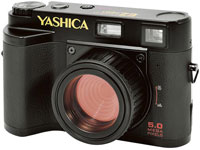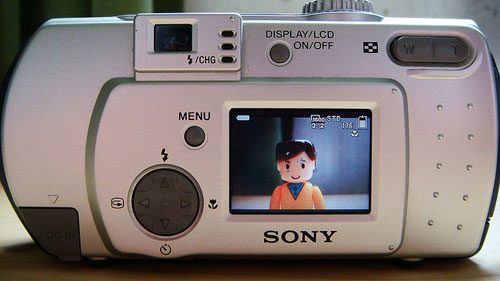Three Ways to Get Rid of that Old Camera: Resell, Reuse, or Recycle
posted Monday, March 26, 2012 at 2:54 PM EDT
 I am a camera junkie. I have owned dozens and dozens of cameras and lenses over the years and I always have a hard time getting rid of any of them.
I am a camera junkie. I have owned dozens and dozens of cameras and lenses over the years and I always have a hard time getting rid of any of them.
But recently, I bought another new digital camera and suddenly realized the situation had gotten out of hand. For my commercial work I use only my two latest cameras and rarely touch the others. Yet each time I get a new model I just move the older cameras farther and father back on my gear shelves.
Clearly, I needed to reduce my size 14 camera footprint. With the rapid turnover of digital gear and with new models coming out every nine or ten months, I bet I’m not the only one with this problem.
It was different with film cameras because they did not change as much and it was always easy to sell or trade-in an older model when I bought a new one. However it's a different story with digital gear.
While it's true some major brand cameras, such as Nikon and Canon, retain their value better because they have kept their lens mounts over many generations, nonetheless, most digital cameras and particularly self-contained devices such as point-and-shoot cameras, compact cameras and “bridge” superzooms, rapidly lose value in the high speed world of constantly changing technology.
 Realistically, who wants a 2001 2MP Sony like the one on the right? Well, maybe someone. So I decided to sell one of my old cameras and now I’d like to present a list of the ways I found for moving older cameras into a new second life.
Realistically, who wants a 2001 2MP Sony like the one on the right? Well, maybe someone. So I decided to sell one of my old cameras and now I’d like to present a list of the ways I found for moving older cameras into a new second life.
But before you get rid of that old camera, consider these three things first:
1. Realistically evaluate the camera’s condition. Are there serious nicks and dings on it? How many hundreds or thousands of images has it taken? How old is it and how many generations removed from current models is it? If the current model of a camera is an FZ7 and I have a seven-year-old FZ8, it's not going to have much value.
2. It's important to hold on to all the accessories and manuals that came with the camera. In reselling a camera, these are the first thing buyers will ask for. It even adds value to have the original box the camera came in.
3. Delete any photos in the camera's built-in memory and if selling a memory card with the camera, reformat it to delete any information it may contain.
The options for disposing of a camera are to resell it, reuse it for repair parts, or reuse as a donation, or recycle and dispose of it properly.
Reselling
Selling an old camera is, of course, the option to look at first. A traditional way to sell a camera had been to place a classified ad in a local newspaper. But living in a small community as I do, this isn’t a very good option. So it’s off to the Internet and long-distance selling.
There are three ways to sell cameras online. The first is through an auction site such as eBay; the next is to sell it to an online camera buyer; and lastly you can list the camera on a classified ad site.
Going to eBay, is a good choice. As a registered, signed in member, I could access their “completed sales” data base. Here I was able to search for recent sales of cameras like mine.
This helped me assess how sellable my camera was and gave me a ballpark figure as to what I could reasonably expect to get if it sold. Looking at this figure I deducted from the fees that eBay and PayPal charge sellers for each transaction and came up with a price I could hope for at auction.
Having found this number, I decided to look around some more before making a final decision. Next, I moved on to camera buyers and there are a surprising number of them.
Over the years I’ve dealt with a few and have found them to be generally fair. At a site such as www.usedcamerabuyer.com or www.gazelle.com I input the the info about my camera and at the click of a mouse got an instant quote from the buyer. Besides sites for camera buyers, many large online camera stores such as www.bhphotovideo.com or www.adorama.com also buy used equipment and provide online quotes.
If I had accepted an offer, the site would have sent me a pre-paid shipping label. With it, I could send the buyer the camera and usually within a week or so get a check. I’ve done this before and most buyers are reputable and pay what they originally offered.
The only snag in this process occurs when the seller has an inflated opinion of the camera’s condition. If a camera is beaten up, say so, it will save everyone a lot of grief. The one problem with camera buyers is their offers tend to be low because they have to have some room to sell the gear and make a profit. Usually, expect to get offered about 40-50% of the retail price for relatively new cameras and 25-35% for older models.
The third possibility for selling a camera is through a classified listing site such as ever-popular www.craigslist.com or one that is part of a photo website. Millions of people use these listings but I find that the buyers here are really bargain hunters. Since these sites have none of the protections provided by a site like eBay, I don’t typically use them.
Repair Parts and Reuse
Realistically the resale value of many older digital cameras is very low but there are some ways for getting rid of them and particularly to have it do some good.
One way is to pass them on to repair shops, especially, if they have been abused. I have a camera repairman friend and when all else fails I have brought him old digital cameras to use for their parts. Recently, Nikon has announced it will not be supplying repair parts for some of its older DSLR, so it might even be possible to sell older Nikon gear, especially broken cameras, to a repair shop for a small fee.
By reuse, though, I mean donating an old but working digital camera to a community group or school. I especially look for things like school photography programs, in the hope that my old camera might just help to spark a love of photography in some kid’s life. Since US tax law allows deduction of charitable gifts, like my camera, there is some financial reward to a donation besides the good feeling of doing something worthwhile.
Goodwill, the Salvation Army and other similar 501 (C) 3 organizations, always welcome these kinds of donations. However, as with any kind of donation, make sure to get a written receipt or donation acknowledgement letter from the organization as proof for the IRS should there be any questions raised about the deduction.
Recycling and Disposal
Digital cameras, and particularly their batteries, contain both valuable rare earth materials and nasty, environmentally dangerous toxins. Consequentially never toss these items into the garbage. Minimally they should be brought to a recycling center or pickup station.
Many camera manufacturers including Panasonic and Kodak, are members of the Electronics Industrial Alliance (EIA). This organization’s purpose is to inform consumers about recycling electronics and at their eCycling Central website http://www.ecyclingcentral.com/ they list recycling centers state by state.
With all of these choices I began to feel really good about letting go of some of my excess gear. And, of course, as soon as I do, it will mean that I have room and a few extra dollars earmarked for the new Nikon Dxxx coming out this summer.